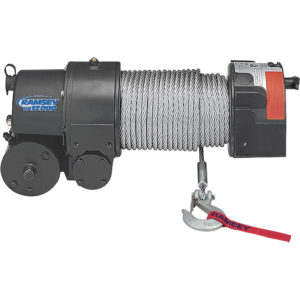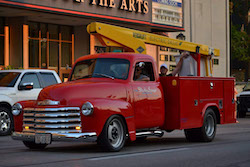Whether you work on electrical lines with a bucket truck or have a business where you need a truck body loaded with tools, you might find yourself in a sticky situation. Work doesn’t stop because Mother Nature dumped a ton of snow and ice on you – in fact, you’re likely to be doing more work after nasty storm. It’s easy enough to slide off an icy road, and when you have work to do, you really don’t want to wait for a tow truck if there is no damage to your truck. Winching yourself out of a bind will get you back to work faster, which means you get to go home and warm up faster.
 Winch Sizes and Capacities
Winch Sizes and Capacities
If the winch you choose is too small for your truck, you might as well not have a winch. When choosing a winch, you’ll have several items to consider. First, the winch must be able to fit your truck. You’ll have to fit another bumper or add a push bar. A third option is use a hidden winch mount on the front or rear of the truck. A front-mounted winch is better than a rear-mounted winch, so you can see where you’re going as you pull yourself out of a sticky situation.
Once you choose the mounting method, you have to look at capacity. The winch needs to be big enough to pull your truck. Winches come in many sizes:
- 9,000 to 9,500 pounds for a midsize truck;
- 12,000 to 12,500 pounds for a full-size truck;
- 16,500 to 18,000 pounds for a bigger truck with a lot of accessories; and
- Bigger winches for trucks with buckets and other heavy equipment.
In this case, bigger is better. You should at least double the weight of your truck. Thus, a 6,000-pound truck needs a 12,000-pound winch. Keep in mind that the bigger winches have bigger motors and spools and they still have to fit on the truck.
Winch Power
Choose electric or hydraulic power for your winch. Electric winches use the vehicle’s battery power to run and usually wind up faster. You can also use the a remote control with the winch, so in some cases, you are safer. If you add an electric winch and you have other equipment that runs off power from the vehicle, be sure you have enough battery power so that the winch works when you need it. In some cases, you may have to install two batteries or a larger amperage alternator.
If you choose hydraulic, you’ll have to run the hydraulic lines for the winch. They are more reliable than electric winches in that they don’t rely on battery power and are not affected by water. Since you have to have hydraulic lines, you need to be sure that this type of winch will fit your truck.
Contact Drake-Scruggs
When you are ready to to install winches on your fleet trucks, contact Drake-Scruggs. We install winches that are tough and ready to work, including Ramsey, Braden, My-Te and Warn Industrial.

